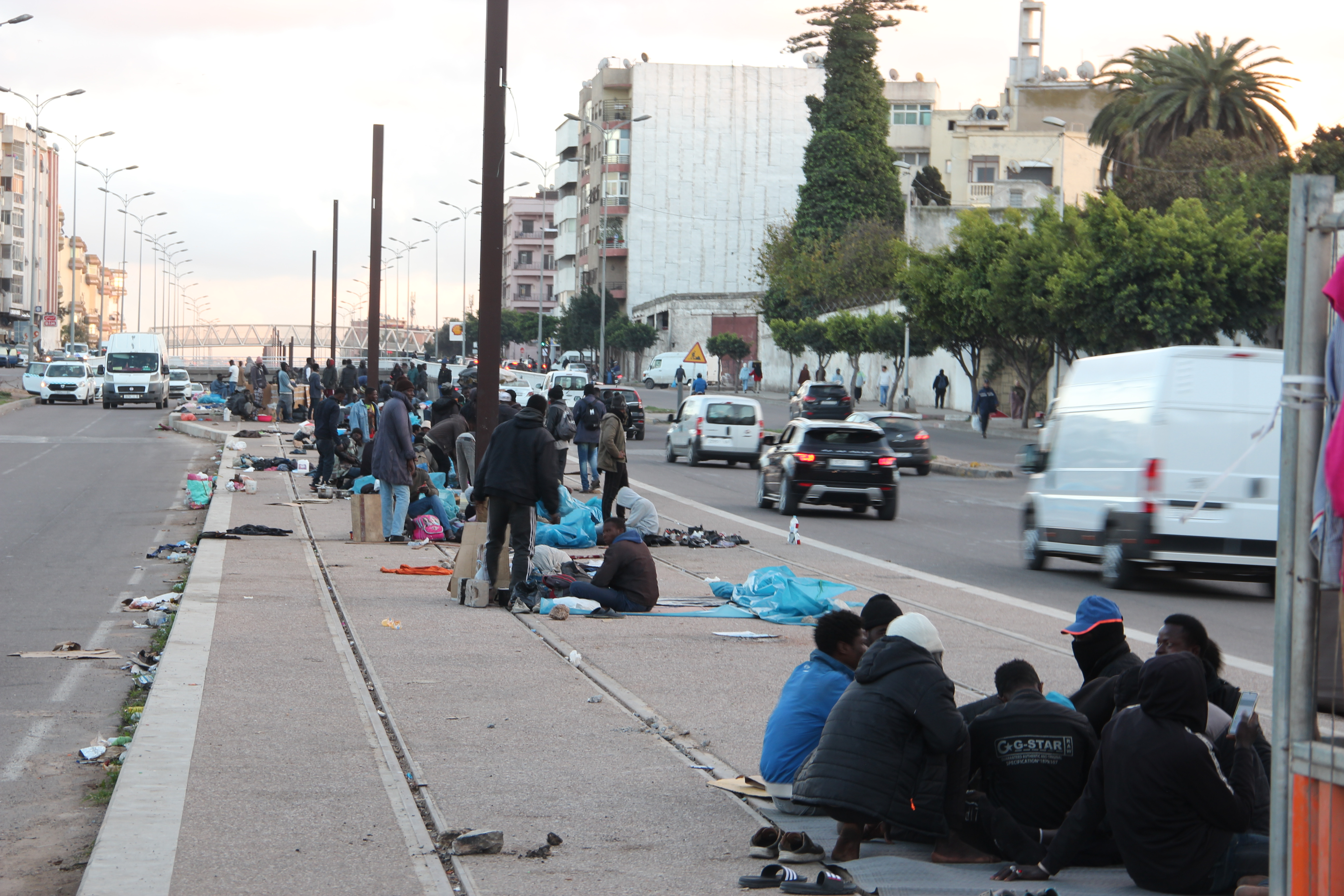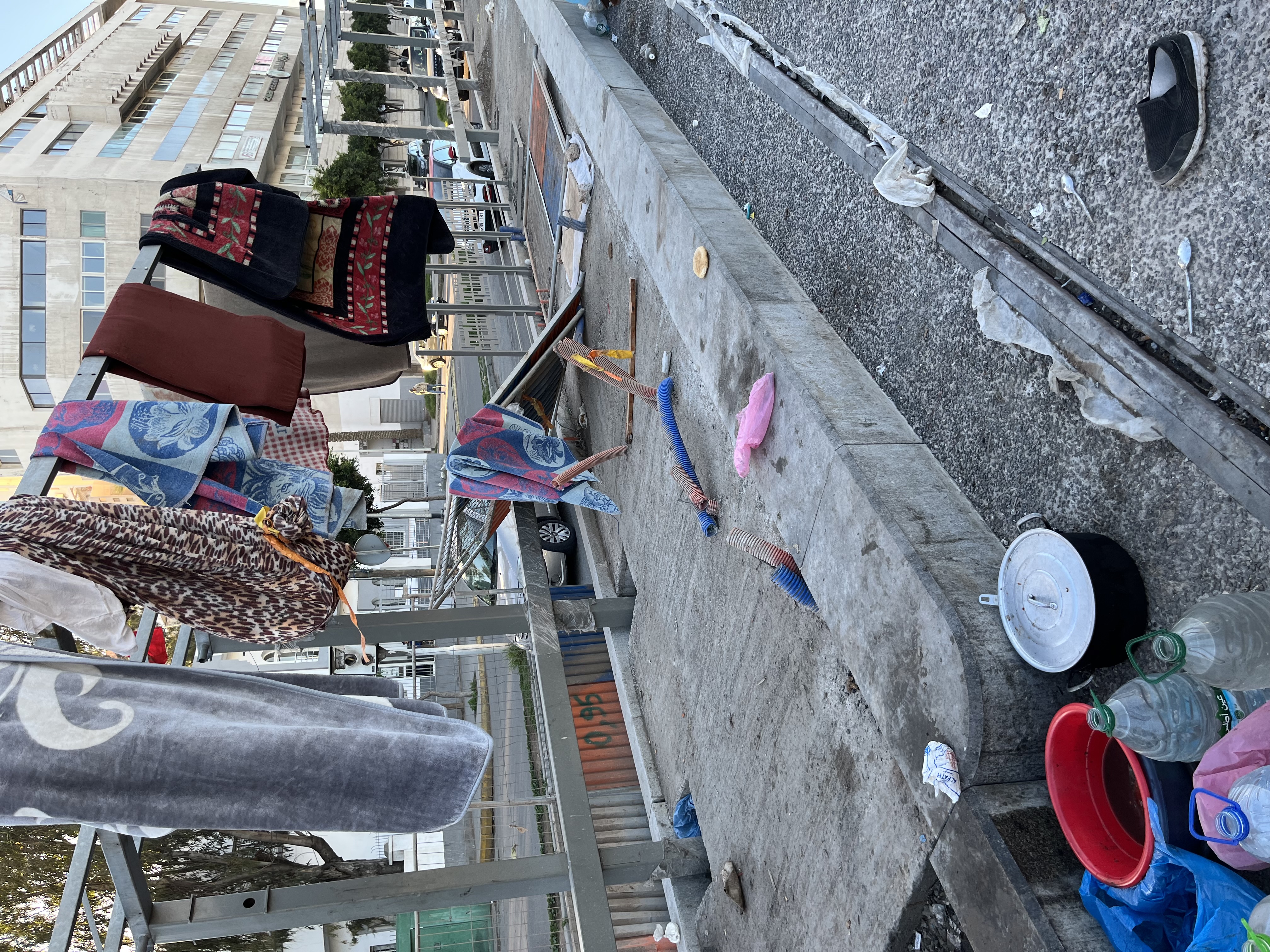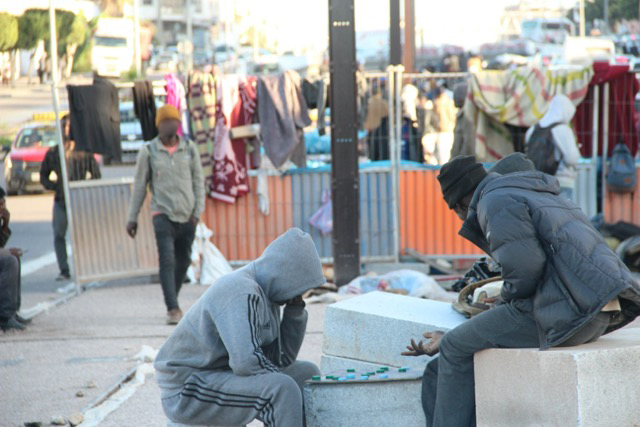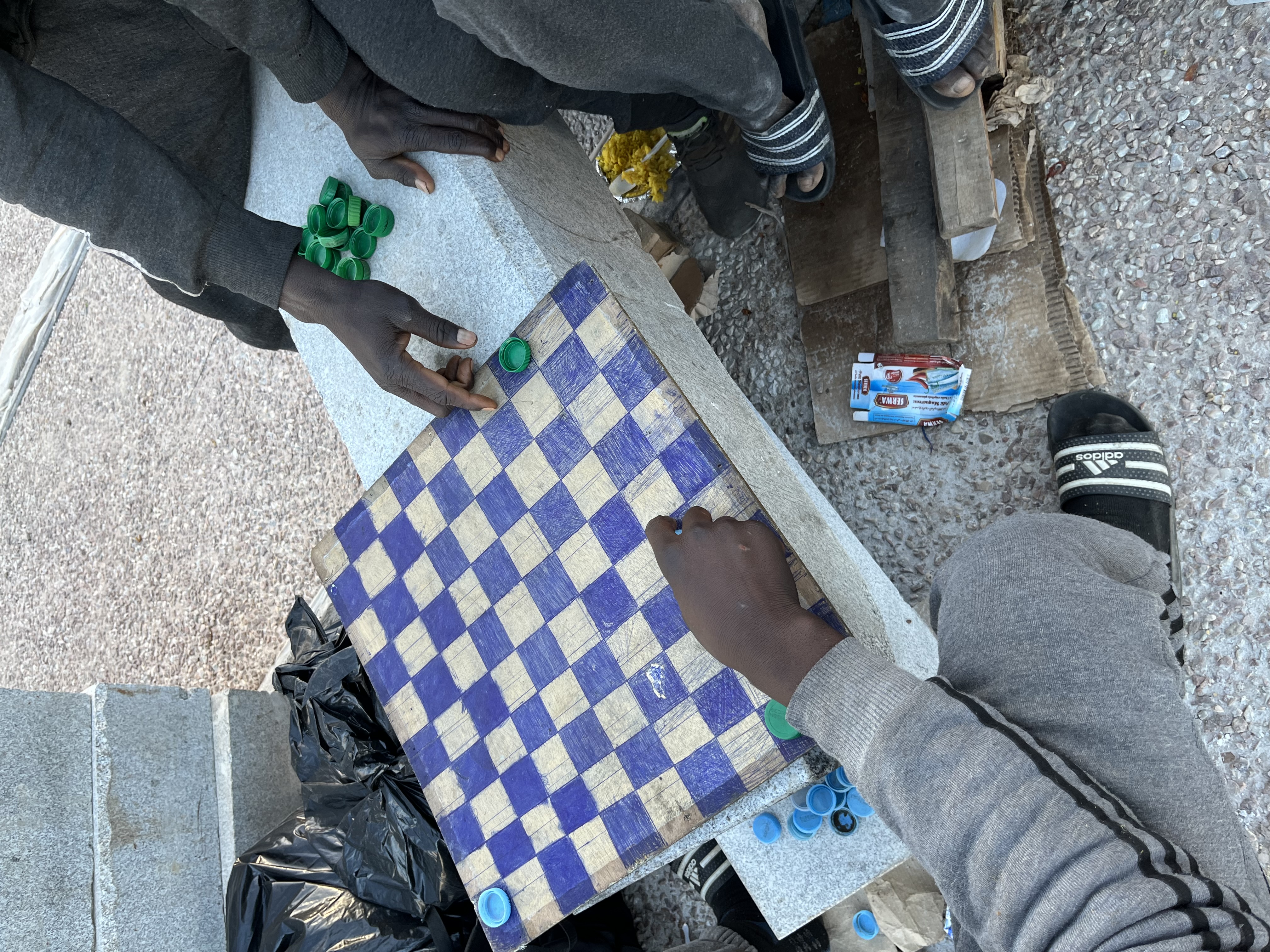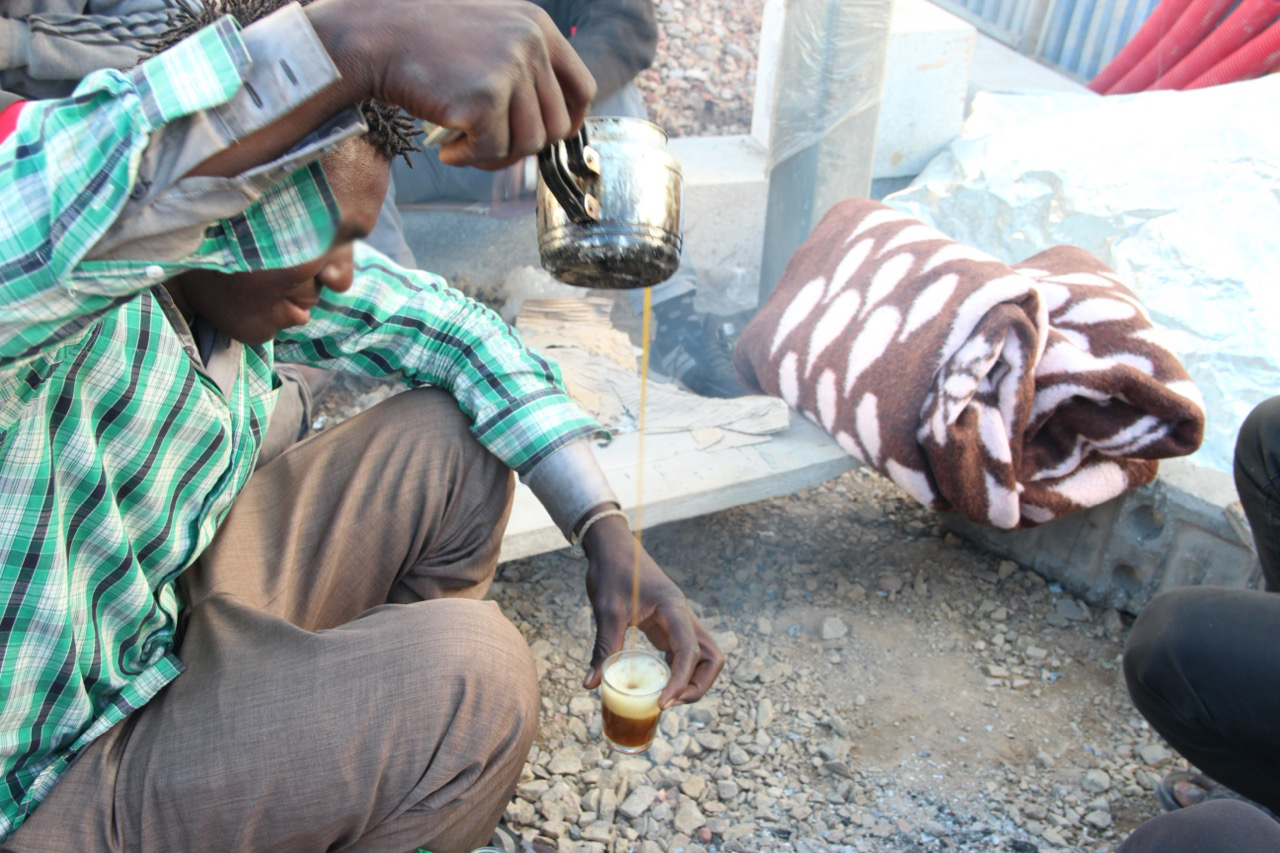“This is not life, living on the street is not living. It’s not fair, Morocco gets money from Europe because of us, they have to help us,” Mohamed says. Abdurrahman insists, “We didn’t come all this way to stay here in Morocco. We want to go to Europe.” Falò recounts, “I have dreams, I left my family in Burkina Faso and promised them that I would make it, that I would get to Europe and send them money.” “They have to open the borders for us, we didn’t come to Morocco to stay there, we want to go to Europe,” says Koné. Europe returns like a mantra, an obsession that warms the cold nights of sub-Saharan migrants.
On one of Casablanca’s busiest thoroughfares and in the adjacent and centrally located Ouled Ziane bus station, in the construction site of the tracks of the third tram line, hundreds of sub-Saharan citizens camp out day and night, consuming their lives waiting and idle and living on handouts and gimmicks. They are so-called transit migrants whose goal – unlike other sub-Saharan nationals who have chosen to settle in Morocco – is to reach the other side of the Mediterranean. A crossing that can take years or break down completely on the barbed wire barrier that separates Morocco from the two Spanish enclaves of Ceuta and Melilla.
I had to approach with caution to collect their testimonies and take photographs. Their massive presence in this area has created a public order emergency, and tension with locals demanding their removal in recent weeks has skyrocketed. And in addition to the difficulty of placing such large numbers of homeless people elsewhere, police have faced resistance to their attempts at eviction. These facts have made the sub-Saharans wary of anyone taking an interest in them, fearing over-mediatization or the instrumental and propagandistic use of their plight.
My first serious interaction was with Koné, a young Burkinabè who set out on foot from his village in the southeast of his home country and ended up in Casablanca six months later. Koné crossed Mali and Algeria with a group of friends and brothers, thousands of miles on foot through immense deserts, conflict zones, no man’s lands, and fiefdoms of warlords. Koné’s journey is not organized according to transportation schedules and has no arrival date; it is a makeshift, one-way trip. It is luck and other arbitrary circumstances over which the migrants have no control that decide how long the crossing will last. Police raids, fatigue, availability of funds, border controls: there are many variables that determine the length of the journey.
From our first meeting I inform him that I would like to write about their plight, I elaborate on why I find the conditions in which they live unacceptable, and I insist that I too have experienced migration. He listens to me with interest but does not accept my request to take pictures, which I consider essential to be able to tell their story in the best possible way, however he offers to talk to his group as well. I know this area well, I drive through it often, but when I find myself sharing the sidewalk with them, my perspective changes dramatically and so do the power relations.
I leave it to Koné to introduce me to his friends in their language, Mooré, to tell them why I am there. They are all from Burkina Faso, Koné addresses one of them in particular with respect, who listens without comment. Concluding his explanation, he invites me to tell the group leader why I am interested in them. When I mention photographing them, the answer is an emphatic no. I ask about their journey, their relationship with Moroccans and the authorities, but the answers are laconic, so I ask how I can help them. Abdurrahman, the group leader with a wave of his hand – as if to say look around – replies that in their current situation, they need everything.
I contact Abdurrahman and Koné again a few days later, meet at the same place, and show up with a bag of clothes, shoes, and a few blankets I remedied from my closet. This time they are more jovial and invite me to distribute the contents of the bag. I feel some embarrassment because I would have preferred to hand the bag over to Koné and for him to give the things to his friends, but intuitively I understand the attempt to help me gain the trust of the group.
After several meetings Koné and his friends, about 20 young people, begin to trust me and show me some photos of their families. With their help I find the exact location of the village where they come from on my maps app and we talk about Burkina Faso. Abdurrahman a few days before our meeting had left for Nador to attempt, unsuccessfully, to cross the barrier. To my question as to why he did not stay in Nador or Tangier to be closer to Ceuta and Melilla, he replies that the police push them back from the border towns and that they are forced to live in the woods under even more difficult conditions than in Casablanca. As Moroccan and Spanish law enforcement agencies have intensified controls around the two enclaves, the possibility of crossing the barrier has been drastically reduced. On June 24 last year, 27 migrants died trying to climb the barbed wire. And makeshift camps in the woods around Nador, Belyounech, and Tangier are continually being cleared causing clashes and violence with the authorities.
During the crossing, migrants are forced to keep a low profile to go as unnoticed as possible. To reach Morocco they have two options: cross Mauritania or Algeria. I am surprised and intrigued when I learn that Koné and his group have passed through Algeria. On paper, the land borders separating Morocco and Algeria are among the most militarized and controlled in the world. Along these borders, the Algerians have dug miles of trenches, while the Moroccans have installed sophisticated control systems with cameras and sentries. However, migrants still manage to pass through paths in forested areas separating the two countries, where controls are more infrequent.
Algerian police, they explain, are fierce: in addition to searches and the confiscation of cell phones, money, and their few personal belongings, they risk arrest and permanent deportation. According to Médecins Sans Frontières, Algeria has expelled more than 90,000 sub-Saharan nationals to Niger over the past four years. In a recent statement, the organization denounced the “summary and chaotic expulsions”. “Migrants are loaded into trucks and buses and abandoned in the middle of the desert a few kilometers from the borders.”
In this patch of land in Casablanca, on the streetcar tracks there are not only Burkinabè, there are Malians, Guineans, Senegalese, Ivorians, Ghanaians and others, and in the apparent confusion of their encampment, made up of deprivation and lack of privacy, a surprising hierarchy and organization reign. They are structured by small groups of 15 or 20 people with aggregation criteria that correspond to logics of not only national, but also local, linguistic and religious backgrounds. I understand, for example, that Abdurrahman, Koné and their friends originate from the same area of Burkina Faso and that the “group leader” has earned his status not only because he is “older” – he is 26 years old – but also because he is the first to have arrived in Casablanca four years ago.
As my visits to the camp continue, I also manage to become acquainted with a group of Malians. They are from the Yofolili district on the border with Guinea, having crossed Mali and Mauritania on foot. We discuss their country, Tombouctou and the conflict in the Sahel. They tell me that the war continues to claim victims, and they do not hide their support for the policies of President Assimi Goïta, who they say is doing a very good job on behalf of the Malian people; one of the boys does not hesitate to show me the T-shirt he wears with the colonel’s picture on it, giving a military salute as a sign of respect. For them Goïta is a response to French imperialism, which they say has stripped the country’s wealth for years. So they are pleased with the withdrawal of the French and the new alliances the colonel is making with the Russians and the Chinese. We have this discussion while sipping tea brewed on a small brazier that Ahmed serves us in turn, in the same glass. Poverty, lack of jobs, wars, natural disasters, terrorism, economic exploitation, political instability, and ethnic conflicts are the major reasons that drive these young people to leave their families and countries, and to live on the streets, risking their lives at every moment.
Taking the time to get to know them, one realizes that their misery is only economic. The migrants who live in Ouled Ziane are not naïve, they have a political and social consciousness, they know their rights, they are ingenious to get by, and most of them have a trade or have completed studies. Koné for example is almost moved when I mention Thomas Sankara‘s name in a discussion, and although the African leader died before his birth, he seems to know a lot about the revolutionary. Also talking about the people who inspire him, he mentions the Burkinabé opponent and journalist Norbert Zongo, who was assassinated in 1998. Yesterday Koné called me, it has only been a few days since we have seen each other, but he keeps asking me to help him in his job search.
The desire to find employment has also been expressed to me by others because Europe remains a distant goal and they can no longer bear the marginal and destitute condition in which they live. The most ingenious have made a virtue of necessity by setting up stalls in the camp to sell cigarettes, cookies and other knick-knacks, others keep food stations on the sidewalk, and still others are barbers or tailors: a micro-economy made by and for migrants.
Cover Photo: Sub-Saharan migrants in Ouled Ziane, Casablanca. All the pictures are by Rabii El Gamrani, all rights are reserved.
Follow us on Facebook, Twitter and LinkedIn to see and interact with our latest contents.
If you like our stories, events, publications and dossiers, sign up for our newsletter (twice a month).



